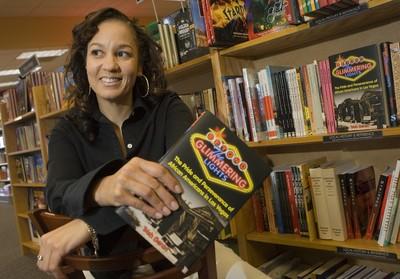Author’s Aunt Mac tells how blacks persevered in Las Vegas

Trish Geran’s Aunt Mac made it clear how moved she was after learning there was a town in Nevada where black people could find work that wasn’t picking cotton: “When I got behind the wheel of the car, all I wanted was Las Vegas in my lap and Mississippi kissing my ass.”
Colorful. Salty. Sassy. Call Aunt Mac what you will — she drove to Las Vegas in 1943 with a Bible, a pistol and a flask of moonshine next to her on the front seat — but you must also call the late Magnolia “Mac” Bailey the dynamic force behind Geran’s book, “Beyond the Glimmering Lights: The Pride and Perseverance of African Americans in Las Vegas.”
“Even back as far as 3 years old, I can remember sitting in Aunt Mac’s lap and her telling me stories about blacks in Las Vegas,” said Las Vegas native Geran, a 46-year-old senior project administrator with JMA Architects. “Without her, there wouldn’t have been a book. … Without her guidance, I wouldn’t have gone on to uncover how Frank Sinatra stopped discrimination against Nat King Cole at the Sands.”
Geran’s book, which leans heavily on her aunt’s connections with hotel housekeeping staffs and laborers during the ’40s, ’50s and ’60s, is one of six recently published works that will be discussed by their Las Vegas authors at a symposium from 1 p.m. to 4 p.m. Saturday at the Las Vegas Library, 833 Las Vegas Blvd. North.
The forum, which allows attendees to speak individually with authors, is sponsored by Las Vegas alumnae of Delta Sigma Theta, a predominantly black sorority found on campuses throughout the nation.
“One of our goals is to expose the community to literature and other arts that are available locally,” said Carolyn Carrier. chairwoman of the arts and letters committee of the Greater Las Vegas Chapter of Delta Sigma Theta. “We have a growing number of black artists that we want to introduce to the community.”
No one can accuse the sorority of not serving up Las Vegas authors with a variety of interests.
Or staying away from controversy.
On hand will be Sophia Stewart, a former New Yorker who has long claimed that her manuscript, “The Third Eye,” was used as the basis for both “The Terminator” and “Matrix” films. Though her 1999 lawsuit for copyright infringement was dismissed by a judge in California in 2005, Stewart said she plans to refile it.
“In response to an ad, I sent my manuscript in during the ’80s,” Stewart said Wednesday from her Las Vegas home. “When I saw the ‘Matrix’ film, I couldn’t believe how it followed what I had written. Justice will prevail one day.”
In 2006, Stewart released “The Third Eye” as a book.
Tech Sgt. Dawn Brown, who’s stationed at Nellis Air Force Base, will discuss a book of poetry, “More Than Poetry, 1993 Until Infinity,” that was inspired in part by her military service.
“When I had time in Iraq, I wrote there,” said Brown, a 13-year military veteran who is a special events coordinator.
The introduction to her poem, “A Soldiers Story,” gives the reader a sense of a young recruit jolted by the reality of war:
Eleven years ago, I took an oath to protect
This country
Not realizing the magnitude of the words I
Spoke…or their real severity
Teddy Osantowski, a former educator in the Las Vegas and Chicago public schools, used her own childhood — one marked by severe beatings from her mother — to write a semi-autobiographical work of fiction, “The Little Survivor.”
“The last thing my mother said before she died was, ‘I should have killed you before you were born,’ ” Osantowski said.
She also has written “The Black Landed Gentry of Montgomery County,” which reveals how the lives of black tobacco farmers were affected by the growth of Fort Campbell, Ky. She wants “The Little Survivor” to make people more vigilant.
“Child abuse has to be reported far more than it is,” Osantowski said. “Too many children are suffering.”
The authors of a nonfiction book, “Spiritual Guide for the Pregnant Woman,” hope their work can contribute to happier childhoods.
Phyllis Beech, a retired federal employee, and Linda Dougan, a psychologist, said the genesis for their book was Jeremiah 1:5, which reads in part: “I knew you before I formed you in your mother’s womb. Before you were born, I set you apart and appointed you as my spokesman to the world.”
Biblical scripture, combined with suggestions that include writing letters and songs to a woman’s unborn child, make the book meaningful to expectant mothers, Beech said. “We want the pregnant mother to sing to her unborn child, to talk with the child so that at the time of birth they can be good friends.”
“I was sitting in church one day and I realized that we have lost maybe two generations of children,” she said. “We have to get back to the basics, to make people understand how important bringing up children is.”
On Wednesday, “Beyond The Glimmering Lights” author Trish Geran was checking on her book sales at a Borders bookstore.
Geran said she has been heartened by the public’s interest in Las Vegas’ black community. She believes that her “telling it like it was” has helped.
There was a time, she said, when entertainers as famous as Nat King Cole, Sammy Davis Jr. and Josephine Baker were treated like “just another nigger.”
She relates how a Last Frontier hotel swimming pool was drained after Baker, a singer beloved around the world, swam in it. Baker never returned to Las Vegas.
Geran’s book explores the black community from the 1920s to 1960, the year she said marks the demise of segregation in the hotel and gaming industry.
She plans on writing another book that would look at the Las Vegas black community from 1960 onward.
“I felt good in my research that Las Vegas had people working to end racial injustice,” Geran said.
Her Aunt Mac, a longtime hotel maid who died in 1995 at the age of 80, counseled her to interview those who are often behind the scenes in hotels and casinos — especially maids and porters and janitors and valets. Geran said that’s how she learned how Frank Sinatra helped Nat King Cole.
“I talked with Sinatra’s valet, a black man named George Jacobs, and he remembered how Sinatra asked him why Nat was always eating in his dressing room instead of the dining room at the Sands,” Geran recalled.
“When he found out that blacks couldn’t be served in the dining room, Sinatra threatened that everyone in the restaurant would be fired if their attitude didn’t change. If my Aunt Mac didn’t know from her friends what was happening, she knew where to point me.”


















